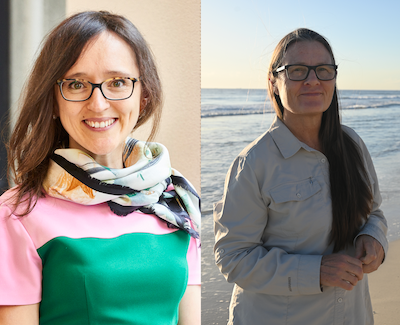
The Australian Academy of Science has announced its 2023 honorific awardees, with several University of Queensland scientists recognised for their outstanding contributions to science.
Two UQ Faculty of Science researchers have been honoured with this award – Associate Professor Teresa Ubide from UQ’s School of Earth and Environmental Sciences and Professor Catherine Lovelock from the School of Biological Sciences.
Dr Ubide, whose work as a volcano scientist involves investigating the triggers of volcanic eruptions, said it was a humbling experience to be the recipient of the 2023 Anton Hales Medal.
“I felt extremely honoured and grateful to those who nominated and supported me,” Dr Ubide said.
“I’m so appreciative of my team of students and collaborators who make what I do possible and so fun.
“To receive this medal, which was established to honour researchers who have made significant contributions to the Earth sciences in their 10 years post-PhD is heart-warming.”
Dr Ubide’s research in the field of volcanology also observes the processes that lead to the accumulation of metals critical to a sustainable future.
“Like a rock detective, I interrogate solidified lava flows, and the crystals they contain, with new laboratory techniques,” Dr Ubide said.
“With lasers like the ones used in eye surgery, I remove thin layers of material from volcanic crystals erupted in the past that I then analyse to reconstruct processes that happen inside volcanoes.
“I’m then able to essentially ‘travel’ inside the volcano and ‘see’ how it works – like opening a doll’s house with the help of science.
“The end goal is to better understand volcanoes in the hope of improving forecasting their future activity and capacity to accumulate metals essential to our low-carbon future.”
Professor Lovelock is a leading global expert on the impacts of climate change on coastal wetlands and the role of coastal ecosystems in mitigating climate change.
Professor Lovelock said she was pleasantly surprised to hear the news she had received the esteemed Suzanne Cory Medal.
“I’m so pleased to have the platform to talk about the importance of coastal wetlands and their conservation and restoration for the benefit of coastal societies,” Professor Lovelock said.
“It’s fabulous to be recognised by my peers and wider community for my contributions to science.”
Professor Lovelock’s research focusses on the influence of environmental change, namely climate change, on coastal and marine ecology, with a particular focus on their plant communities, such as mangroves.
“I’m actually an ecologist, meaning I look closely at how ecosystems work and how all the different parts – whether it’s plants, insects, frogs, or crocodiles – work together,” Professor Lovelock said.
“I’ve been working to explore the vulnerability of mangroves and saltmarshes to climate change, and also how these ecosystems can help us adapt to climate change, particularly through their role as blue carbon.
“This acknowledgement reflects how science has propelled coastal ecosystems into being globally recognised as important for resilience of the coastal zone.”
If there is a researcher you would like to nominate for a 2024 award or grant, head to the Australian Academy of Science site for more details.



